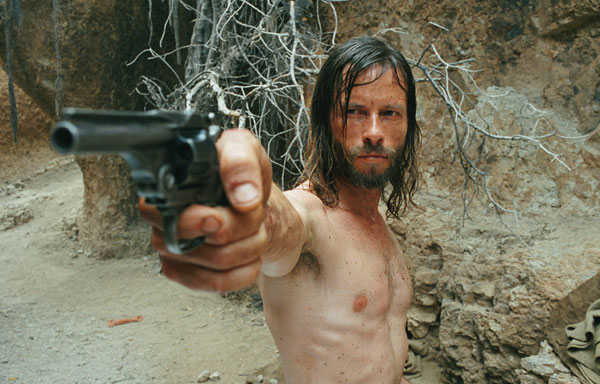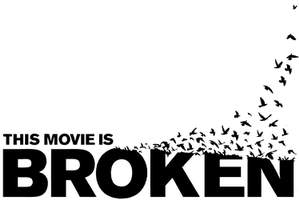Throughout the month of December, TV Editor Kate Kulzick and Film Editor Ricky D will review classic Christmas adaptions, posting a total of 13 each, one a day, until the 25th of December.
The catch: They will swap roles as Rick will take on reviews of classic television Christmas specials and Kate will take on Christmas movies. Today is day 6.
The Proposition (2005)
Written by Nick Cave
Directed by John Hillcoat
What’s it about?
In order to save his youngest brother, a member of a family of outlaws is given until Christmas to hunt down and kill his eldest brother.
Review
 The Western has had several incarnations over the years. From the daring adventure films of the 40s to the increasing violent films of the 60s to the harsh and often bleak takes popular from the 90s on. The Proposition is another excellent entry in the long line of Westerns looking at men on the frontier, living a hard life and either struggling against or embracing what it can do to a man’s soul. This particular film adds in the element of family- what do we owe our family and to what extent are we defined by them?
The Western has had several incarnations over the years. From the daring adventure films of the 40s to the increasing violent films of the 60s to the harsh and often bleak takes popular from the 90s on. The Proposition is another excellent entry in the long line of Westerns looking at men on the frontier, living a hard life and either struggling against or embracing what it can do to a man’s soul. This particular film adds in the element of family- what do we owe our family and to what extent are we defined by them?
 Much of this film is put on the shoulders of Guy Pearce and Ray Winstone as the outlaw sent to hunt down his brother and the Captain doing his best to civilize his corner of the Australian frontier; both succeed effortlessly. Nick Cave’s screenplay is appropriately economical in its dialogue, relying upon the characters’ expressions and body language to convey much of the meaning. It also lends the film a stillness, matched in the performances, that feels particularly appropriate to Charlie’s (Pearce) arc, as he helplessly waits for Christmas to come, uncertain where his duty and loyalties lie.
Much of this film is put on the shoulders of Guy Pearce and Ray Winstone as the outlaw sent to hunt down his brother and the Captain doing his best to civilize his corner of the Australian frontier; both succeed effortlessly. Nick Cave’s screenplay is appropriately economical in its dialogue, relying upon the characters’ expressions and body language to convey much of the meaning. It also lends the film a stillness, matched in the performances, that feels particularly appropriate to Charlie’s (Pearce) arc, as he helplessly waits for Christmas to come, uncertain where his duty and loyalties lie.
 The performances are strong throughout the cast featuring memorable turns by Emily Watson as Captain Stanley’s wife, David Wenham as Stanley’s shortsighted boss, and John Hurt as a bounty hunter out to find the Burns gang. Danny Huston is given the difficult task, not dissimilarly to Orson Welles in The Third Man, of paying off the incredible amount of mystery built up around his character, the violent head of the Burns gang and Charlie’s eldest brother, throughout the first section of the film and he succeeds tremendously, creating a character both loving to his family and psychotically cruel to his victims.
The performances are strong throughout the cast featuring memorable turns by Emily Watson as Captain Stanley’s wife, David Wenham as Stanley’s shortsighted boss, and John Hurt as a bounty hunter out to find the Burns gang. Danny Huston is given the difficult task, not dissimilarly to Orson Welles in The Third Man, of paying off the incredible amount of mystery built up around his character, the violent head of the Burns gang and Charlie’s eldest brother, throughout the first section of the film and he succeeds tremendously, creating a character both loving to his family and psychotically cruel to his victims.
 Along with the performances, The Proposition features fantastic cinematography showing at once the beauty and harshness of the Australian Outback where Martha Stanley’s rose garden sticks out like a sore thumb, an attempt to hold back and tame the isolating wilderness. A lot of time is given to the observance of sunsets, as Charlie and the audience count down the days until Christmas, and these moments are the most peaceful of the film. The score contributes to the sense of scope and space with sparse instrumentation and a few recurring themes contrasting the civilization of, for example, Martha with Charlie and his struggle to decide where he belongs and what responsibilities this gives him.
Along with the performances, The Proposition features fantastic cinematography showing at once the beauty and harshness of the Australian Outback where Martha Stanley’s rose garden sticks out like a sore thumb, an attempt to hold back and tame the isolating wilderness. A lot of time is given to the observance of sunsets, as Charlie and the audience count down the days until Christmas, and these moments are the most peaceful of the film. The score contributes to the sense of scope and space with sparse instrumentation and a few recurring themes contrasting the civilization of, for example, Martha with Charlie and his struggle to decide where he belongs and what responsibilities this gives him.
Westerns are making a bit of a comeback on television, but very few have been particularly successful at the box office, at least in the US. Many consider the genre uninteresting or feel there’s little more to be said with it. The Proposition is proof that the Western is as vital as ever and those who have overlooked it should seek it out.
How Christmassy is it?
While not traditionally Christmassy, the holiday is very strongly felt throughout the film, from the plot points to the strong themes of family, sin, and corruption, which are given more significance by the seasonal setting. On the Christmas movie scale (1=Brazil, 5=A Christmas Story), this gets a 2.
You may like it if…
You like Westerns, messed up families, or good, intense dramas.
Final thoughts: The Proposition is impressive and bold. It’s a great film and one of the best Westerns of the past 20 years.
Kate Kulzick




